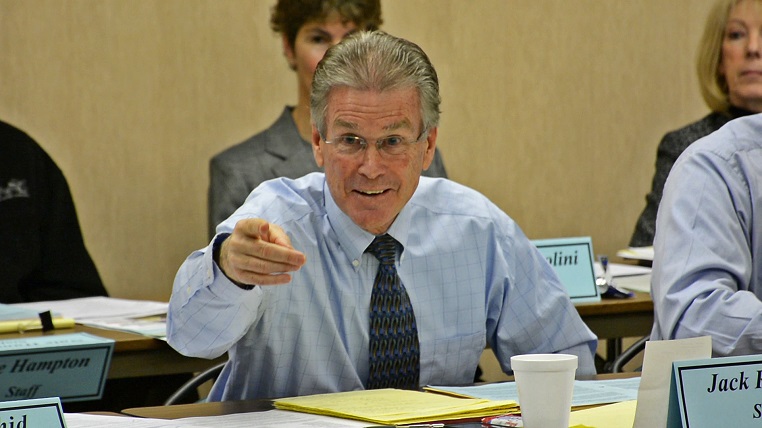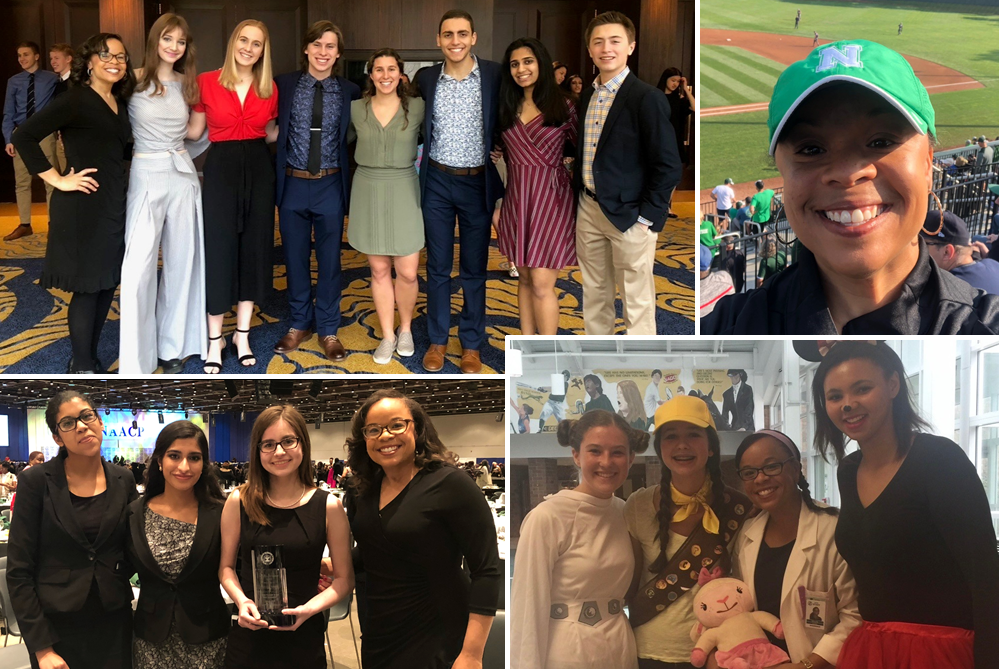
Retired MHSAA Executive Director Roberts Selected for NFHS Hall of Fame
By
Geoff Kimmerly
MHSAA.com senior editor
March 8, 2022
During an award introduction two years ago, MHSAA associate director Tom Rashid described his longtime close friend Jack Roberts as the leader who “took our darkest hours and problems and turned them into positives.”
The MHSAA has faced its share of challenging times, and those may have been among Roberts’ finest hours over 32 years as MHSAA executive director – and admittedly the times when his adrenaline flowed most. But there were many more good times and memorable advances for Michigan school sports under his leadership, and he will be recognized again this summer both for those and a lifetime of service to school sports in this state and across the nation.
John E. “Jack” Roberts was one of 12 honorees announced Tuesday as this year’s inductees into the National High School Sports Hall of Fame by the National Federation of State High School Associations (NFHS). He will be inducted as one of three former state association administrators selected for the 39th Hall of Fame class at a ceremony during the NFHS summer meeting July 1 in San Antonio, Texas.
He began his tenure as MHSAA executive director in 1986, and at the time of his retirement he was the nation’s longest-serving executive director of a state high school athletic association. He was the fourth person to serve the MHSAA in that leadership role full time, following Charles E. Forsythe (1931-42, 1945-68), Allen W. Bush (1968-78) and Vern L. Norris (1978-86).
Roberts will become the Hall of Fame’s ninth inductee from Michigan, joining Forsythe (inducted 1983), River Rouge boys basketball coach Lofton Greene (1986), Warren Regina athletic director, softball and basketball coach Diane Laffey (2000), Fennville basketball and baseball standout Richie Jordan (2001), Grosse Pointe Woods University Liggett boys and girls tennis coach Bob Wood (2005), Bloomfield Hills Cranbrook hockey standout Jim Johnson (2007), Owosso football, basketball and baseball all-stater Brad Van Pelt (2011); and Vermontville Maple Valley baseball national record holder Ken Beardslee (2016).
Roberts also follows in the footsteps of his late father, John Roberts, who served as executive director of the Wisconsin Interscholastic Athletic Association from 1957-85 and was inducted into the National High School Hall of Fame in 2000. They will be the first father-son team in the Hall of Fame.
Jack Roberts began his career serving as an assistant director for the National Federation from 1973-80. He was involved with the implementation of Title IX at the local and state levels and made immense contributions as the NFHS representative to the landmark Amateur Sports Act of 1978, and also played a significant role in the NFHS rules-writing process as the organization started writing and publishing rules for a number of new sports during the 1970s.
The MHSAA enjoyed continued growth under Roberts’ guidance, particularly in the number of Michigan students participating in athletics and in the number of MHSAA-sponsored tournament sports available to them. Several key rules changes came under Roberts’ watch and direction, and he made the MHSAA a national leader in health and safety efforts particularly in the areas of head injury care, heart safety initiatives and heat management strategies.
“I had a head start in this work. Growing up in the home of the executive director of the Wisconsin Interscholastic Athletic Association and then spending most of my 20s working for the National Federation office, and much of it with (longtime NFHS executive director) Cliff Fagan, was a jumpstart on this career,” Roberts said. “But I’m also satisfied at this point that, to paraphrase Hamilton in the musical ‘Hamilton,’ I didn’t give up on my shot. I was given a shot, I took it and I didn’t waste the chance.
“The job fit me, and I think I maxed the opportunity I had to serve educational athletics in this job, and that’s satisfying to think about at this time.”
 Under Roberts’ leadership, overall participation in high school athletics in Michigan increased 10 percent, and the MHSAA added more than 200 schools in increasing its membership by more than 15 percent at the high school and junior high/middle school levels combined. His tenure saw the addition of girls competitive cheer (1994), girls & boys bowling (2004) and girls & boys lacrosse (2005) to the MHSAA Tournament sport lineup, the creation of a separate wrestling tournament to determine champions by team format (1988), and 8-player football (2010, first playoffs 2011) as many small schools across the state began having trouble fielding 11-player teams because of enrollment and population decreases. Meanwhile, also under his leadership, the 11-player Football Playoffs expanded, doubling to 256 teams in 1999.
Under Roberts’ leadership, overall participation in high school athletics in Michigan increased 10 percent, and the MHSAA added more than 200 schools in increasing its membership by more than 15 percent at the high school and junior high/middle school levels combined. His tenure saw the addition of girls competitive cheer (1994), girls & boys bowling (2004) and girls & boys lacrosse (2005) to the MHSAA Tournament sport lineup, the creation of a separate wrestling tournament to determine champions by team format (1988), and 8-player football (2010, first playoffs 2011) as many small schools across the state began having trouble fielding 11-player teams because of enrollment and population decreases. Meanwhile, also under his leadership, the 11-player Football Playoffs expanded, doubling to 256 teams in 1999.
Among rules changes put in place during Roberts’ tenure was the addition of opportunities for multiple schools to create cooperative teams in sports where participation is lagging. He also helped Michigan become a national leader in improving sportsmanship; a comprehensive package enacted in 1996 set a statewide tone for appropriate behavior and perspective that continues to make an impact today.
Perhaps the most significant influences by Roberts came on the topics of health and safety. The MHSAA has led nationally in concussion care with its first programming in 2000 and return-to-play protocols enacted in 2010, and with mandated concussion reporting and insurance for those who suffer head injuries rolled out in 2015. A heat management policy and CPR requirements for coaches were introduced in 2013.
Also under this leadership, the first program for coaches education was launched in 1987 and evolved into the Coaches Advancement Program, with nearly 34,000 courses administered as part of CAP since 2004-05. The Women in Sports Leadership Conference was created in 1989 and remains the first, largest and longest-running program of its type in the country, regularly drawing upwards of 500 participants. The first of now-annual statewide Athletic Director In-Service Programs was conducted in 1992, and Michigan also remains a national leader in student services thanks to a variety of programs that were introduced under Roberts’ leadership.
Internally, he put the MHSAA on the leading edge nationally when it came to use the technology, especially in the realm of communications, where he put special emphasis on telling the story of school sports. “I think I was considered a conservative as to rules for eligibility and competition, and a progressive in how we delivered services to schools and school sports,” Roberts said.
In addition to his work specifically in Michigan, Roberts carried significant influence at the national level. He served as part of the NFHS Board of Directors and led the creation of the NFHS Network for video productions in 2012, serving as that board’s chairperson. He also has served on the board of directors of the National Association of Sports Officials (NASO).
“For 32 years, Jack Roberts was the epitome of what leadership looks like. He was the strongest advocate for high school sports that anyone could ever hope for,” said MHSAA Executive Director Mark Uyl, who succeeded Roberts in 2018. “He is without question one of the preeminent pioneers and difference-makers in the world of high school sports over the past 100 years.
“And other than my father, there has not been a man who has had a bigger impact and positive influence on my life personally than Jack Roberts.”
The National High School Hall of Fame was started in 1982 by the NFHS, and the rest of this year’s class is made up of athletes, coaches, administrators and an official. The 12 individuals were chosen after a two-level selection process involving a screening committee composed of active high school state association administrators, coaches and officials, and a final selection committee composed of coaches, former athletes, state association officials, media representatives and educational leaders. Nominations were made through NFHS member associations. Also chosen for this class were athletes Notah Begay (New Mexico), Walter Payton (Mississippi), Sanya Richards-Ross (Florida) and Thurman Thomas (Texas); sport coaches Ray Crowe (Indiana), Ron Kordes (Kentucky) and Lamar Rogers (Tennessee); administrators E. Wayne Cooley (Iowa) and Becky Oakes (Missouri), official Jeff Risk (North Dakota) and speech/debate coach Susan McLain (Oregon). (Click for more.)
Roberts came to the MHSAA in 1986 from the Fellowship of Christian Athletes, which he served as executive vice president. He is a 1970 graduate of Dartmouth College and taught English and coached football at high schools in Milwaukee and Denver before joining the NFHS staff.
He and his wife Peggy reside in East Lansing, and in retirement they together have increased their contributions to environmental matters and international refugee issues while both serving in leadership roles. Jack Roberts has served as board president for the Refugee Development Center in Lansing for 13 years, and Peggy Roberts served six years as chairperson of the board for Lansing’s Fenner Nature Center. As part of their environmental work, the Roberts are working within a small group of organizations to help them acquire and preserve land.

Novi Principal, Past MHSAA Council VP Carter to Receive Inaugural Hampton Award
By
Geoff Kimmerly
MHSAA.com senior editor
March 4, 2024
Nicole Carter grew up in a family of educators, aspired to become one herself, and has dedicated her career to providing opportunities in all facets of education – including educational athletics – to all students through her vision and inspiration. To celebrate Carter’s continuing contributions especially to underrepresented groups in school sports, she has been selected as the inaugural honoree of the Michigan High School Athletic Association’s Nate Hampton Champion of Progress in Athletics Award.
The Hampton Award was created by the MHSAA’s Representative Council to honor Nate Hampton, who retired in 2021 after serving in education and educational athletics for 50 years, including the last 32 years as an MHSAA assistant director. Honorees have championed the promotion and advancement of opportunities for women, minorities and other underrepresented groups within interscholastic athletics, while serving as an administrator, coach, official, educator or school sports leader in Michigan.
Carter, in her 10th year as principal at Novi High School, was selected as the first recipient of the Hampton Award by the Representative Council at its Fall meeting in December and will be recognized during the Boys Basketball Finals on March 16 at Michigan State University’s Breslin Center.
“As an advocate and strong proponent of athletics, I understand wholeheartedly the impact they have on the whole child,” Carter said. “This is a surreal moment for me, and I’m truly honored to be the recipient of this award, keeping in mind the impact Nate Hampton had on athletics in the state of Michigan over several decades – it’s very humbling.”
Carter began at Novi in 1999, teaching for eight years before moving into administration as dean of student activities for three years and then assistant principal for three. She became principal with the 2013-14 school year and leads a staff of 140 in educating more than 2,100 students.
While leading one of the state’s largest and most highly-regarded high schools – and one of Michigan’s most diverse, with her students’ families speaking more than 70 languages at home – Carter has provided her expertise through several more efforts. She served four years on the MHSAA Representative Council, from 2019-23, and as its vice president for the 2022-23 school year. She has served on the MHSAA’s Sports Medicine Advisory Committee, and volleyball and classification committees, and presented at the annual Women In Sports Leadership Conference on social and emotional skill building. She also has served as president of the Kensington Lakes Activities Association.
“Nicole Carter serves with the mindset of providing opportunities for all students as the principal at one of the largest and most diverse high schools in Michigan, and students statewide benefitted from her leadership during her time as part of the Representative Council and Executive Committee,” MHSAA Executive Director Mark Uyl said. “No matter the topic or details of a situation, Nicole looks at it from a rational point of view in deciding what’s best for kids. She continues to emphasize that academics must be the highest priority in a student’s education, and she can provide that perspective with a wider lens as someone with a strong background in and understanding of the role of athletics.”
Service through education is a tradition in Carter’s family. Her grandfather Charles Butler Nuckolls served as a principal in Kentucky for 40 years prior to desegregation. Her father Gene Nuckolls also spent 40 years in education, including as principal of Saginaw High School and assistant superintendent for Saginaw Public Schools, while Carter’s mother Shirley Nuckolls dedicated 40 years as a teacher, assistant principal and guidance counselor within the Saginaw district.
Carter’s selection for the Hampton Award is something of a full-circle moment for her family. Gene Nuckolls hired Hampton as supervisor of athletic and physical education for Saginaw Public Schools in 1987.
Carter was named Michigan High School Principal of the Year in 2022 by the Michigan Association of Secondary School Principals (MASSP) and Michigan Association of Student Councils and Honor Societies (MASC/MAHS). She additionally has been recognized as a Diversity Champion as part of The Community House honor roll recognition program, and was selected as an African American Educator of the Year by the Michigan Lottery in 2016. She also was recognized in 2017 by the Oakland County Coordinating Council Against Domestic Violence.
Drawing from her athletic background and perspective, Carter noted that she strives to be a coach and mentor – as well as a teacher of teachers and students as principal at her school.
She also has continually looked to create inclusive opportunities during her tenure, citing Novi’s Special Olympics Unified Sports program as a significant point of pride for the school.
“I always lead from the lens of equity and inclusion and accessibility, and I’m always trying to identify opportunities for students to find their place,” Carter said. “Ensuring every single student in our school has a sense of belonging is one of my top priorities as principal.”
Carter is a 1993 graduate of Saginaw Heritage, where she played basketball, soccer and softball. She earned bachelor’s degrees in political science, with a minor in English, and secondary education from Michigan State University in 1999 and her master’s in curriculum and instruction from MSU in 2001. She also has an educational leadership degree from Oakland University. Carter taught civics/economics and U.S. government and politics at Novi before moving into administration.
PHOTOS courtesy of Novi Community School District.

